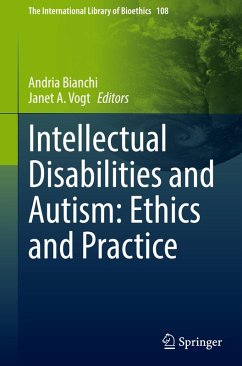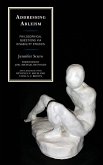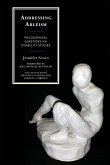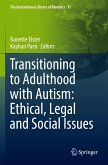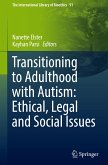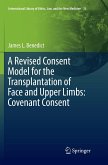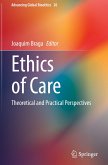Intellectual Disabilities and Autism: Ethics and Practice
Herausgegeben:Bianchi, Andria; Vogt, Janet A.
Intellectual Disabilities and Autism: Ethics and Practice
Herausgegeben:Bianchi, Andria; Vogt, Janet A.
- Gebundenes Buch
- Merkliste
- Auf die Merkliste
- Bewerten Bewerten
- Teilen
- Produkt teilen
- Produkterinnerung
- Produkterinnerung
This book meaningfully reflects upon difficult, timely, and debated ethics questions relating to people with intellectual disabilities (IDs) and autistic people. The book challenges now dated perceptions and introduces innovative ideas by leading scholars regarding some of the most complex, controversial, and relevant ethical dilemmas involving these neurodiverse populations. People with IDs and/or those on the autism spectrum continue to experience various forms of oppression and unjust treatment across the globe, despite the UN Convention on the Rights of Persons with Disabilities…mehr
Andere Kunden interessierten sich auch für
![Addressing Ableism Addressing Ableism]() Jennifer ScuroAddressing Ableism127,99 €
Jennifer ScuroAddressing Ableism127,99 €![Addressing Ableism Addressing Ableism]() Jennifer ScuroAddressing Ableism53,99 €
Jennifer ScuroAddressing Ableism53,99 €![Special Olympics Oral History Volume 4 Special Olympics Oral History Volume 4]() Special Olympics Oral History Volume 4105,99 €
Special Olympics Oral History Volume 4105,99 €![Transitioning to Adulthood with Autism: Ethical, Legal and Social Issues Transitioning to Adulthood with Autism: Ethical, Legal and Social Issues]() Transitioning to Adulthood with Autism: Ethical, Legal and Social Issues38,99 €
Transitioning to Adulthood with Autism: Ethical, Legal and Social Issues38,99 €![Transitioning to Adulthood with Autism: Ethical, Legal and Social Issues Transitioning to Adulthood with Autism: Ethical, Legal and Social Issues]() Transitioning to Adulthood with Autism: Ethical, Legal and Social Issues52,99 €
Transitioning to Adulthood with Autism: Ethical, Legal and Social Issues52,99 €![A Revised Consent Model for the Transplantation of Face and Upper Limbs: Covenant Consent A Revised Consent Model for the Transplantation of Face and Upper Limbs: Covenant Consent]() James L. BenedictA Revised Consent Model for the Transplantation of Face and Upper Limbs: Covenant Consent38,99 €
James L. BenedictA Revised Consent Model for the Transplantation of Face and Upper Limbs: Covenant Consent38,99 €![Ethics of Care Ethics of Care]() Ethics of Care97,99 €
Ethics of Care97,99 €-
-
-
This book meaningfully reflects upon difficult, timely, and debated ethics questions relating to people with intellectual disabilities (IDs) and autistic people. The book challenges now dated perceptions and introduces innovative ideas by leading scholars regarding some of the most complex, controversial, and relevant ethical dilemmas involving these neurodiverse populations. People with IDs and/or those on the autism spectrum continue to experience various forms of oppression and unjust treatment across the globe, despite the UN Convention on the Rights of Persons with Disabilities (CRPD).
The collection explores questions such as: Can people with IDs make informed decisions about their medical treatment, living circumstances, and overall life? What are the ethical implications of selective termination of pregnancy based on a gene linked to a condition conferring intellectual impairment? How can we ensure that people with IDs and autistic people are meaningfully included in research? Can people with IDs successfully parent? How can we support the capabilities of neurodiverse populations such that they enjoy the rights afforded by the CRPD? Each contributor critically examines how we can move forward to create a world that understands and respects the rights of every person with ID and/or autism. An indispensable read for bioethicists, ethics students, social justice scholars, and others interested in and working with people with IDs and autistic people.
The collection explores questions such as: Can people with IDs make informed decisions about their medical treatment, living circumstances, and overall life? What are the ethical implications of selective termination of pregnancy based on a gene linked to a condition conferring intellectual impairment? How can we ensure that people with IDs and autistic people are meaningfully included in research? Can people with IDs successfully parent? How can we support the capabilities of neurodiverse populations such that they enjoy the rights afforded by the CRPD? Each contributor critically examines how we can move forward to create a world that understands and respects the rights of every person with ID and/or autism. An indispensable read for bioethicists, ethics students, social justice scholars, and others interested in and working with people with IDs and autistic people.
Produktdetails
- Produktdetails
- The International Library of Bioethics 108
- Verlag: Springer / Springer International Publishing / Springer, Berlin
- Artikelnr. des Verlages: 978-3-031-61564-1
- 2024
- Seitenzahl: 460
- Erscheinungstermin: 2. September 2024
- Englisch
- Abmessung: 241mm x 160mm x 31mm
- Gewicht: 795g
- ISBN-13: 9783031615641
- ISBN-10: 3031615646
- Artikelnr.: 70431994
- Herstellerkennzeichnung
- Springer Nature c/o IBS
- Benzstrasse 21
- 48619 Heek
- Tanja.Keller@springer.com
- The International Library of Bioethics 108
- Verlag: Springer / Springer International Publishing / Springer, Berlin
- Artikelnr. des Verlages: 978-3-031-61564-1
- 2024
- Seitenzahl: 460
- Erscheinungstermin: 2. September 2024
- Englisch
- Abmessung: 241mm x 160mm x 31mm
- Gewicht: 795g
- ISBN-13: 9783031615641
- ISBN-10: 3031615646
- Artikelnr.: 70431994
- Herstellerkennzeichnung
- Springer Nature c/o IBS
- Benzstrasse 21
- 48619 Heek
- Tanja.Keller@springer.com
Andria Bianchi works as a Clinical Ethicist at the Centre for Clinical Ethics at Unity Health Toronto. As part of her role, Andria provides clinical, organizational, and research ethics support to Surrey Place. Surrey Place is the lead agency for Developmental Services Ontario Toronto Region, providing support to people of all ages, including autistic people, and those with developmental and sensory-related concerns. Andria was introduced to Surrey Place ten years ago during her ethics training, and has had the pleasure being their consulting ethicist for the past 5 years. Given her experiences in the developmental sector, Andria is often consulted at local acute and post-acute care hospitals when ethical dilemmas arise regarding the provision of care for people with intellectual disabilities and those on the autism spectrum. In addition to her role as an ethicist, Andria is an Assistant Professor at the University of Toronto in the Dalla Lana School of Public Health, where she has taught Clinical Bioethics to fourth year undergraduate students, supervised Master of Health Sciences in Bioethics students, and offered countless guest lectures. Andria focuses her teaching and research on ethical complexities related to persons with cognitive impairments. Prior to commencing her career in bioethics, she completed her Ph.D. in Philosophy where she focused her doctoral research on sexual decision-making and people with cognitive impairments, specifically those with dementia. Andria has published several individual and co-authored peer-reviewed publications, non-peer reviewed publications, and book chapters, many of which relate to people with cognitive impairments and/or disabilities. She has presented her work at local, national, and international conferences. Andria is also a primary ethics columnist for Hospital News (Canada's largest healthcare newspaper) and serves as an editor of the Canadian Journal of Bioethics. ¿ Janet Vogt is Senior Research Associate and Manager in the Research, Evaluation & Education Department at Surrey Place. She completed her Ph.D. in Nutritional Sciences and her M.H.Sc. in Bioethics at the University of Toronto, having completed her undergraduate degrees at the University of British Columbia. At Surrey Place, she has been a member of the Research Ethics Board, co-chair of the Clinical Ethics Committee, and currently leads the Ethics Education working group. As the Surrey Place ethics lead with Toronto's Community Ethics Network, she led the development of an organizational ethics framework and toolkit for community agencies. Each year, she mentors medical students from the University of Toronto, engaging them in projects designed to raise their awareness of bioethics issues arising in the delivery of health care and other services for people with developmental disabilities. She has presented on ethics, developmental disabilities, and nutrition at local, national, and international conferences and has taught university courses in nutrition and research methods as well as giving guest lectures in the Master of Health Sciences (Bioethics) program. Her publications include co-authored peer-reviewed publications, book chapters, and tools to support healthcare access for people with developmental disabilities. Her education in developmental disabilities began in childhood as the sister to an older sibling with a severe developmental disability.
Part 1: Moral Status.- Chapter 1. The Disabled Contract: A Précis (Jonas-Sébastien Beaudry).- Chapter 2. All You Need is Love (for Full Moral Status) (Abraham Graber).- Chapter 3. The Peanut Butter Falcon, Social Contract Theory, and the Dream of Mutual Aid (Stacy Clifford Simplican).- Chapter 4. From Baby Doe to Selective Termination for Down Syndrome (Chris Kaposy).- Part 2: Capacity and Consent.- Chapter 5. Free Britney! Capacity, Competence, and Consent for Those with Diminished Decision-Making Abilities (Abraham Graber).- Chapter 6. Capacity-Based Competency Assessment and Its Impact on Child Custody Cases Amongst Parents
with Intellectual Disabilities (Marjorie Aunos).- Chapter 7. Sexual Consent and People with Intellectual and Developmental Disability (Andria Bianchi).- Chapter 8. Inclusion of Adults with Intellectual and Developmental Disabilities in Low-Risk Research: Consent and Accommodations (Janet A. Vogt).- Part 3: Inclusion and Empowerment: Society, Systems, and Ethics.- Chapter 9. Beyond Words: Access to Justice for Persons Labelled with Intellectual Disabilities and Clear Language Judgement Making (Tess Sheldon).- Chapter 10. Disrupting Oppression: Critical Systems Thinking and Ethics in Autism Research (Dora M. Raymaker).- Chapter 11. Social Validity and the Consideration of Neurodiversity in Relation to Ethics (Joy F. Johnson).- Chapter 12. Disability and Subsidiarity: Toward Social and Political Inclusion (Parker Gamble).- Part 4: Inclusion and Empowerment: Practical Approaches.- Chapter 13. How Does the WHO's Framework for Functioning, Disability and Health (ICF) Provide an Ethical Foundation for 21st Century Clinicians? (Gabriel M. Ronen).- Chapter 14. The Potential Contribution of Ethical Frameworks in Guiding the Development of Digitally Inclusive Support Practices for Adults with Learning Disabilities (Jane Seale).- Chapter 15. Promoting Advocacy and Empowerment for Individuals with Intellectual Disabilities and Autism (Meghan M. Burke).- Chapter 16. A Justice Perspective on Ecologically-Based Employment Pathways for individuals with Disabilities (Laura R. Bowman).- Chapter 17. Self-Advocacy and Community Advocacy amongst Youths with Disabilities (Dolly Menna-Dack).- Part 5: Sexuality, Intimacy, Romance and Parenting.- Chapter 18. The Impact of Ableism on the Sexual, Reproductive, and Parenting Rights of People with Intellectual Disabilities (Robyn M. Powell).- Chapter 19. "Somebody You Love": Romantic Relationships and Mental Health amongst People with Intellectual and Developmental Disabilities (Marina Heifetz).- Chapter 20. Sexual Education and Empowerment Amongst People with Intellectual and Developmental Disabilities (Elizabeth K. Schmidt).- Chapter 21. The Intersection of Mothering, Intellectual Disabilities, and Culture (Laura Pacheco).- Part 6: Health Care.- Chapter 22. Collaborating with People with Intellectual Disabilities and Autism in Healthcare Education (Shay Dawson).- Chapter 23. Reproductive Health and Pregnancy Outcomes (Hilary K. Brown).- Chapter 24. The Ethics of Cancer Care for People with Intellectual Disabilities (Julie S. Armin).- Chapter 25. Intellectual Disability, Euthanasia, and Assisted Suicide (Tim Stainton).- Part 7: Ethical Responses to 'Behaviours'.- Chapter 26. Engendering a Feeling of Safety for People with Developmental Disabilities (IDD/ASD), as an Ethical Imperative in Preventing Emotional Distress and Behaviours that Challenge Services (Elspeth Bradley).- Chapter 27. Self-Determination and Alcohol Use: Exploring the Intersection of Ethics and Harm Reduction for People with Intellectual Disabilities (Brooke Magel).- Chapter 28. Reducing Restraint and Restrictive Behaviour Management Practices: Ethics and Practice (Peter Sturmey).- Chapter 29. Ethical Considerations Arising in the Assessment, Treatment, and Support of Individuals and
Families Living with FASD (Kiruthiha Vimalakanthan).- Chapter 30. A Proposal for Training ABA Practitioners in Ethical Deliberation (Nicole Luke).
with Intellectual Disabilities (Marjorie Aunos).- Chapter 7. Sexual Consent and People with Intellectual and Developmental Disability (Andria Bianchi).- Chapter 8. Inclusion of Adults with Intellectual and Developmental Disabilities in Low-Risk Research: Consent and Accommodations (Janet A. Vogt).- Part 3: Inclusion and Empowerment: Society, Systems, and Ethics.- Chapter 9. Beyond Words: Access to Justice for Persons Labelled with Intellectual Disabilities and Clear Language Judgement Making (Tess Sheldon).- Chapter 10. Disrupting Oppression: Critical Systems Thinking and Ethics in Autism Research (Dora M. Raymaker).- Chapter 11. Social Validity and the Consideration of Neurodiversity in Relation to Ethics (Joy F. Johnson).- Chapter 12. Disability and Subsidiarity: Toward Social and Political Inclusion (Parker Gamble).- Part 4: Inclusion and Empowerment: Practical Approaches.- Chapter 13. How Does the WHO's Framework for Functioning, Disability and Health (ICF) Provide an Ethical Foundation for 21st Century Clinicians? (Gabriel M. Ronen).- Chapter 14. The Potential Contribution of Ethical Frameworks in Guiding the Development of Digitally Inclusive Support Practices for Adults with Learning Disabilities (Jane Seale).- Chapter 15. Promoting Advocacy and Empowerment for Individuals with Intellectual Disabilities and Autism (Meghan M. Burke).- Chapter 16. A Justice Perspective on Ecologically-Based Employment Pathways for individuals with Disabilities (Laura R. Bowman).- Chapter 17. Self-Advocacy and Community Advocacy amongst Youths with Disabilities (Dolly Menna-Dack).- Part 5: Sexuality, Intimacy, Romance and Parenting.- Chapter 18. The Impact of Ableism on the Sexual, Reproductive, and Parenting Rights of People with Intellectual Disabilities (Robyn M. Powell).- Chapter 19. "Somebody You Love": Romantic Relationships and Mental Health amongst People with Intellectual and Developmental Disabilities (Marina Heifetz).- Chapter 20. Sexual Education and Empowerment Amongst People with Intellectual and Developmental Disabilities (Elizabeth K. Schmidt).- Chapter 21. The Intersection of Mothering, Intellectual Disabilities, and Culture (Laura Pacheco).- Part 6: Health Care.- Chapter 22. Collaborating with People with Intellectual Disabilities and Autism in Healthcare Education (Shay Dawson).- Chapter 23. Reproductive Health and Pregnancy Outcomes (Hilary K. Brown).- Chapter 24. The Ethics of Cancer Care for People with Intellectual Disabilities (Julie S. Armin).- Chapter 25. Intellectual Disability, Euthanasia, and Assisted Suicide (Tim Stainton).- Part 7: Ethical Responses to 'Behaviours'.- Chapter 26. Engendering a Feeling of Safety for People with Developmental Disabilities (IDD/ASD), as an Ethical Imperative in Preventing Emotional Distress and Behaviours that Challenge Services (Elspeth Bradley).- Chapter 27. Self-Determination and Alcohol Use: Exploring the Intersection of Ethics and Harm Reduction for People with Intellectual Disabilities (Brooke Magel).- Chapter 28. Reducing Restraint and Restrictive Behaviour Management Practices: Ethics and Practice (Peter Sturmey).- Chapter 29. Ethical Considerations Arising in the Assessment, Treatment, and Support of Individuals and
Families Living with FASD (Kiruthiha Vimalakanthan).- Chapter 30. A Proposal for Training ABA Practitioners in Ethical Deliberation (Nicole Luke).
Part 1: Moral Status.- Chapter 1. The Disabled Contract: A Précis (Jonas-Sébastien Beaudry).- Chapter 2. All You Need is Love (for Full Moral Status) (Abraham Graber).- Chapter 3. The Peanut Butter Falcon, Social Contract Theory, and the Dream of Mutual Aid (Stacy Clifford Simplican).- Chapter 4. From Baby Doe to Selective Termination for Down Syndrome (Chris Kaposy).- Part 2: Capacity and Consent.- Chapter 5. Free Britney! Capacity, Competence, and Consent for Those with Diminished Decision-Making Abilities (Abraham Graber).- Chapter 6. Capacity-Based Competency Assessment and Its Impact on Child Custody Cases Amongst Parents
with Intellectual Disabilities (Marjorie Aunos).- Chapter 7. Sexual Consent and People with Intellectual and Developmental Disability (Andria Bianchi).- Chapter 8. Inclusion of Adults with Intellectual and Developmental Disabilities in Low-Risk Research: Consent and Accommodations (Janet A. Vogt).- Part 3: Inclusion and Empowerment: Society, Systems, and Ethics.- Chapter 9. Beyond Words: Access to Justice for Persons Labelled with Intellectual Disabilities and Clear Language Judgement Making (Tess Sheldon).- Chapter 10. Disrupting Oppression: Critical Systems Thinking and Ethics in Autism Research (Dora M. Raymaker).- Chapter 11. Social Validity and the Consideration of Neurodiversity in Relation to Ethics (Joy F. Johnson).- Chapter 12. Disability and Subsidiarity: Toward Social and Political Inclusion (Parker Gamble).- Part 4: Inclusion and Empowerment: Practical Approaches.- Chapter 13. How Does the WHO's Framework for Functioning, Disability and Health (ICF) Provide an Ethical Foundation for 21st Century Clinicians? (Gabriel M. Ronen).- Chapter 14. The Potential Contribution of Ethical Frameworks in Guiding the Development of Digitally Inclusive Support Practices for Adults with Learning Disabilities (Jane Seale).- Chapter 15. Promoting Advocacy and Empowerment for Individuals with Intellectual Disabilities and Autism (Meghan M. Burke).- Chapter 16. A Justice Perspective on Ecologically-Based Employment Pathways for individuals with Disabilities (Laura R. Bowman).- Chapter 17. Self-Advocacy and Community Advocacy amongst Youths with Disabilities (Dolly Menna-Dack).- Part 5: Sexuality, Intimacy, Romance and Parenting.- Chapter 18. The Impact of Ableism on the Sexual, Reproductive, and Parenting Rights of People with Intellectual Disabilities (Robyn M. Powell).- Chapter 19. "Somebody You Love": Romantic Relationships and Mental Health amongst People with Intellectual and Developmental Disabilities (Marina Heifetz).- Chapter 20. Sexual Education and Empowerment Amongst People with Intellectual and Developmental Disabilities (Elizabeth K. Schmidt).- Chapter 21. The Intersection of Mothering, Intellectual Disabilities, and Culture (Laura Pacheco).- Part 6: Health Care.- Chapter 22. Collaborating with People with Intellectual Disabilities and Autism in Healthcare Education (Shay Dawson).- Chapter 23. Reproductive Health and Pregnancy Outcomes (Hilary K. Brown).- Chapter 24. The Ethics of Cancer Care for People with Intellectual Disabilities (Julie S. Armin).- Chapter 25. Intellectual Disability, Euthanasia, and Assisted Suicide (Tim Stainton).- Part 7: Ethical Responses to 'Behaviours'.- Chapter 26. Engendering a Feeling of Safety for People with Developmental Disabilities (IDD/ASD), as an Ethical Imperative in Preventing Emotional Distress and Behaviours that Challenge Services (Elspeth Bradley).- Chapter 27. Self-Determination and Alcohol Use: Exploring the Intersection of Ethics and Harm Reduction for People with Intellectual Disabilities (Brooke Magel).- Chapter 28. Reducing Restraint and Restrictive Behaviour Management Practices: Ethics and Practice (Peter Sturmey).- Chapter 29. Ethical Considerations Arising in the Assessment, Treatment, and Support of Individuals and
Families Living with FASD (Kiruthiha Vimalakanthan).- Chapter 30. A Proposal for Training ABA Practitioners in Ethical Deliberation (Nicole Luke).
with Intellectual Disabilities (Marjorie Aunos).- Chapter 7. Sexual Consent and People with Intellectual and Developmental Disability (Andria Bianchi).- Chapter 8. Inclusion of Adults with Intellectual and Developmental Disabilities in Low-Risk Research: Consent and Accommodations (Janet A. Vogt).- Part 3: Inclusion and Empowerment: Society, Systems, and Ethics.- Chapter 9. Beyond Words: Access to Justice for Persons Labelled with Intellectual Disabilities and Clear Language Judgement Making (Tess Sheldon).- Chapter 10. Disrupting Oppression: Critical Systems Thinking and Ethics in Autism Research (Dora M. Raymaker).- Chapter 11. Social Validity and the Consideration of Neurodiversity in Relation to Ethics (Joy F. Johnson).- Chapter 12. Disability and Subsidiarity: Toward Social and Political Inclusion (Parker Gamble).- Part 4: Inclusion and Empowerment: Practical Approaches.- Chapter 13. How Does the WHO's Framework for Functioning, Disability and Health (ICF) Provide an Ethical Foundation for 21st Century Clinicians? (Gabriel M. Ronen).- Chapter 14. The Potential Contribution of Ethical Frameworks in Guiding the Development of Digitally Inclusive Support Practices for Adults with Learning Disabilities (Jane Seale).- Chapter 15. Promoting Advocacy and Empowerment for Individuals with Intellectual Disabilities and Autism (Meghan M. Burke).- Chapter 16. A Justice Perspective on Ecologically-Based Employment Pathways for individuals with Disabilities (Laura R. Bowman).- Chapter 17. Self-Advocacy and Community Advocacy amongst Youths with Disabilities (Dolly Menna-Dack).- Part 5: Sexuality, Intimacy, Romance and Parenting.- Chapter 18. The Impact of Ableism on the Sexual, Reproductive, and Parenting Rights of People with Intellectual Disabilities (Robyn M. Powell).- Chapter 19. "Somebody You Love": Romantic Relationships and Mental Health amongst People with Intellectual and Developmental Disabilities (Marina Heifetz).- Chapter 20. Sexual Education and Empowerment Amongst People with Intellectual and Developmental Disabilities (Elizabeth K. Schmidt).- Chapter 21. The Intersection of Mothering, Intellectual Disabilities, and Culture (Laura Pacheco).- Part 6: Health Care.- Chapter 22. Collaborating with People with Intellectual Disabilities and Autism in Healthcare Education (Shay Dawson).- Chapter 23. Reproductive Health and Pregnancy Outcomes (Hilary K. Brown).- Chapter 24. The Ethics of Cancer Care for People with Intellectual Disabilities (Julie S. Armin).- Chapter 25. Intellectual Disability, Euthanasia, and Assisted Suicide (Tim Stainton).- Part 7: Ethical Responses to 'Behaviours'.- Chapter 26. Engendering a Feeling of Safety for People with Developmental Disabilities (IDD/ASD), as an Ethical Imperative in Preventing Emotional Distress and Behaviours that Challenge Services (Elspeth Bradley).- Chapter 27. Self-Determination and Alcohol Use: Exploring the Intersection of Ethics and Harm Reduction for People with Intellectual Disabilities (Brooke Magel).- Chapter 28. Reducing Restraint and Restrictive Behaviour Management Practices: Ethics and Practice (Peter Sturmey).- Chapter 29. Ethical Considerations Arising in the Assessment, Treatment, and Support of Individuals and
Families Living with FASD (Kiruthiha Vimalakanthan).- Chapter 30. A Proposal for Training ABA Practitioners in Ethical Deliberation (Nicole Luke).

